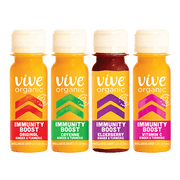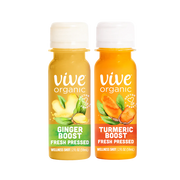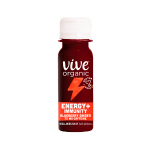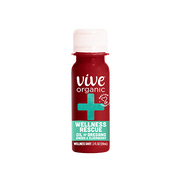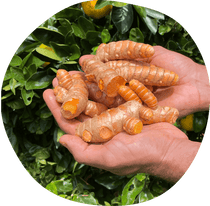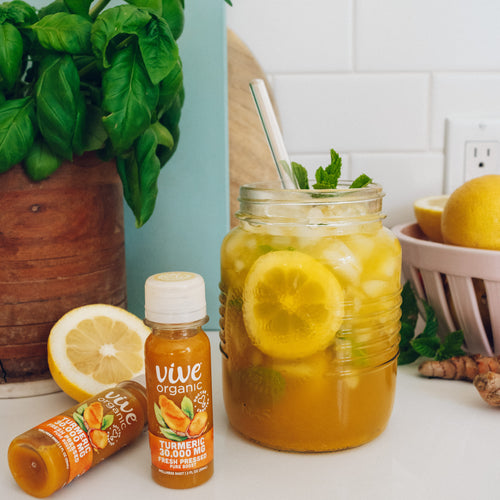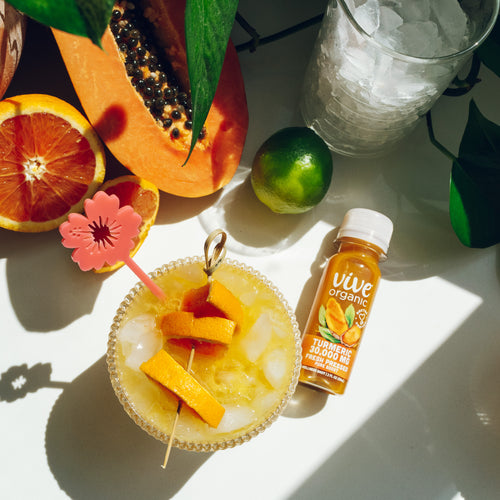If you’re adding ginger to your meals or getting your daily dose via a ginger shot, then you are aware of the functional components this spice brings to the table. In this article, we'll look at the natural science behind this root, including its potential health benefits.
What Is Ginger?
Ginger is a rhizome (root) that is well-known for its zesty flavor and delightfully warm sensation when added to foods or beverages. And if you want a little more kick from this natural beauty, grating or peeling the ginger root and eating a piece raw will do the trick.
The ginger plant produces small purple and yellow-green flowers, but as beautiful as they are, it is the ginger plant's root or underground stem that is used for a variety of purposes. The use of ginger can be traced back to Southeastern Asia, and it has also been part of Chinese and Indian cuisine and medicinal purposes for thousands of years.1,2
Let’s take a look at some of the different types of ginger and the spice it adds to our lives.
Types of Ginger
When ginger is harvested the rhizome is dug out of the ground, washed, and often left to dry. Interestingly there are so many ways that ginger is prepared and used in our daily diets as well. Here we can check out some of the numerous ways that ginger is brought to the table.3
Fresh ginger
Most people reach for fresh ginger when they want to grate, or mince form ginger into some of their favorite dishes. Adding some into a smoothie can also deliver a welcomed aromatic spicy taste. When you’re shopping around, it is best to stay clear of ginger with wrinkled skin, and instead select that knobby root with smooth skin to ensure you are selecting a fresh ginger.
Baby ginger
This young ginger is picked early and lends a subtle spiciness to dishes. It can be used for a variety of dishes and may curb nausea if you take a bite or two.
Ground ginger
This form of ginger has a delicious, yet peppery taste with a warm afternote. Ground ginger is often used to add flavor to baked goods and can be the perfect substitute for recipes that call for fresh ginger. Just keep in mind you may need to decrease the amount of ground ginger in the recipe, since it is potent.
Pickled Ginger
If you like a little twist in flavor, then you may enjoy some pickled ginger. Usually sliced very thin, this ginger is pickled with sweet vinegar. It is used in a variety of dishes, salads, and also used to garnish a prepared dish.
Now that we have explored some of the various forms that we can enjoy ginger, let’s delve into some of the benefits of ginger.
5 Potential Health Benefits of Ginger
The ginger rhizome contains many bioactive plant components. In fact, more than 100 naturally occurring bioactive compounds have been found in ginger, all of which may contribute to its health-promoting properties. Though the studies show that ginger has potential benefits for health, more research is needed.
1. Provides potent antioxidants.
Gingerols are the most common phytocompounds classified as polyphenols. Gingerols are known for their strong antioxidant properties. Though free radicals are naturally produced during metabolism, an increase or imbalance of free radicals can lead to oxidative stress. As a result, ginger and its numerous antioxidants may help to reduce or prevent oxidative stress while also restoring balance to the body's various systems.4,5,6
2. May support heart health.
Cardioprotective properties have been associated with the use of this rhizome. A review of several studies on the effects of ginger supplementation found that it was effective in supporting healthy lipid metabolism, particularly in lowering LDL cholesterol and triglyceride levels. Although promising, further research is needed. Furthermore, it is recommended that you always discuss with your healthcare provider (HCP) your health concerns and any supplementation options.7,8
3. Supports gut health and digestion.
Consuming ginger may help calm an upset stomach and aid digestion. Ginger increases saliva production and stimulates bile action which may aid digestion. Since ginger helps with the transit or movement of food through the gastrointestinal tract, it may contribute to some relief from nausea and vomiting. Though the exact mechanism by which ginger affects nausea and vomiting is unknown, recent research suggests that active compounds like gingerols, shogaols, and diterpenoids play an important role in nausea relief.7,9
4. May support glucose metabolism.
According to studies, consuming ginger extract may have a favorable effect on glucose metabolism. Ginger may promote healthy glucose metabolism by increasing the uptake or use of glucose by muscle cells.10,11
5. Natural antimicrobial and antibacterial properties.
Ginger root is a natural source rich in antimicrobial compounds that include phenols like gingerol, flavonoids, and essential oils, that may help to inhibit microbial growth.12
Ginger Shots — Cheers To Good Health
You'll undoubtedly want to find the best ingredients to promote good health and clean living. Including more ginger in your daily or weekly intake may be beneficial, and an organic ginger wellness shot and its benefits may be the ideal supplement to your diet. This pressed juice root not only has a zesty flavor, but it also helps you get your daily dose of vitamin C and potassium.
Though ginger in any form can be beneficial, it is always advisable to consult with your doctor about any potential food, supplement, or medication interactions.
Disclaimer: This blog contains promotional content about our products. The information provided in this blog is for educational and informational purposes only and should not be construed as medical advice. While the nutritional information and health tips shared here are based on published studies and expert insights, they should not replace advice and treatment from a healthcare professional. Always consult a qualified healthcare provider with any questions you may have regarding a medical condition or health objectives.
References
- Anh, Nguyen Hoang et al. “Ginger on Human Health: A Comprehensive Systematic Review of 109 Randomized Controlled Trials.” Nutrients vol. 12,1 157. 6 Jan. 2020, doi:10.3390/nu12010157.
- “Ginger: Usefulness and Safety.” NCCIH. https://www.nccih.nih.gov/health/ginger. Accessed September 6, 2024.
- Ayomari. “12 Varieties of Culinary Ginger, Explained.” Tasting Table, 12 Jan. 2023. https://www.tastingtable.com/1165727/varieties-of-culinary-ginger-explained. Accessed September 6, 2024.
- Zagórska, Justyna et al. “Influence of Diet on the Bioavailability of Active Components from Zingiber officinale Using an In Vitro Digestion Model.” Foods (Basel, Switzerland) vol. 12,21 3897. 24 Oct. 2023, doi:10.3390/foods12213897.
- Mashhadi, Nafiseh Shokri et al. “Anti-oxidative and anti-inflammatory effects of ginger in health and physical activity: review of current evidence.” International journal of preventive medicine vol. 4,Suppl 1 (2013): S36-42.
- Masuda, Yuki et al. “Antioxidant properties of gingerol related compounds from ginger.” BioFactors (Oxford, England) vol. 21,1-4 (2004): 293-6. doi:10.1002/biof.552210157.
- Srinivasan, Krishnapura. “Ginger Rhizomes (Zingiber Officinale): A Spice With Multiple Health Beneficial Potentials.” PharmaNutrition, vol. 5, no. 1, Jan. 2017, pp. 18–28, doi:10.1016/j.phanu.2017.01.001.
- Pourmasoumi, Makan et al. “The effect of ginger supplementation on lipid profile: A systematic review and meta-analysis of clinical trials.” Phytomedicine vol. 43 (2018): 28-36. doi:10.1016/j.phymed.2018.03.043.
- Tóth, Barbara et al. “Ginger (Zingiber officinale): An alternative for the prevention of postoperative nausea and vomiting. A meta-analysis.” Phytomedicine vol. 50 (2018): 8-18. doi:10.1016/j.phymed.2018.09.007.
- Tajik Kord, Marjan et al. “Ginger Extract Increases GLUT-4 Expression Preferentially Through AMPK Than PI3K Signalling Pathways in C2C12 Muscle Cells.” Diabetes, Metabolic Syndrome and Obesity vol. 13, 3231–3238. 15 Sep. 2020. doi:10.2147/DMSO.S260224.
- Arablou, Tahereh et al. “The effect of ginger consumption on glycemic status, lipid profile and some inflammatory markers in patients with type 2 diabetes mellitus.” Int J Food Sci Nutr vol. 65,4 (2014): 515–520. doi:10.3109/09637486.2014.880671.
- Elfaky, Mahmoud A., et al. “Assessing the Antibacterial Potential of 6-gingerol: Combined Experimental and Computational Approaches.” Saudi Pharmaceutical Journal, vol. 32, no. 5, Mar. 2024, p. 102041. doi:10.1016/j.jsps.2024.102041.
